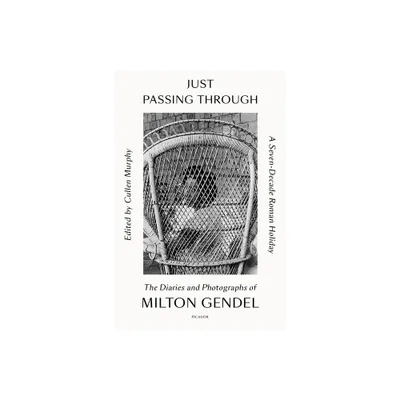Home
Passing Through the Wall
Loading Inventory...
Barnes and Noble
Passing Through the Wall
Current price: $18.49


Barnes and Noble
Passing Through the Wall
Current price: $18.49
Loading Inventory...
Size: OS
*Product Information may vary - to confirm product availability, pricing, and additional information please contact Barnes and Noble
Back in 2009,
Zevious
asserted a newfound avant jazz-metal identity on their second album,
After the Air Raid
, distancing themselves from the creative jazz mindset of their 2008 eponymous debut. Still,
didn't entirely abandon fans who enjoyed the trio's jazzy side -- for example, the initial moments of the album's opening track, "Where's the Captain?," found guitarist
Mike Eber
tossing some jazz chords around before shattering them with an abrupt blast of metal and fusoid skronk. Several years later,
return with
Passing Through the Wall
, their third album overall (and second on
Cuneiform
), and the bandmembers apparently feel no need to ease listeners into the pummeling territory they have now seized and call their own. The 2013 album finds
immediately demanding that you "Attend to Your Configuration," a title that might suggest a directive from your friendly corporate IT department. The band leaps into interlocking guitar and bass riffs, stopping briefly for a
Fripp-ish
lick -- a mere hint of the
King Crimson
-style guitaristics to follow -- before resuming the mechanistic momentum and then throwing dirty metallic chords and stop-start rhythms into the stew. Halfway through, the band shifts the momentum downward as
's guitar roars,
Johnny DeBlase
's bass rumbles, and drummer
Jeff Eber
smashes his way back into faster but determinedly off-kilter rhythms. The jazz buffet is clearly over.
Mid-'70s
Crimson
fans who thought
Starless and Bible Black
's "Fracture" needed additional fracturing will find what they're looking for in "Was Solis," with guitar and bass unified in a twisted, skewed ostinato before breaking into complementary roles poised halfway between agitated solos and scored/composed riffs as
throws in steady-pulse cymbal hits to keep the overall propulsion rolling forward; later,
burns through a solo proving that he's the equal of any fusion guitar hero you might name. Over a hiccupping bass pattern, the crunch of a shifting yet somehow steady guitar chord precedes and then suddenly interrupts the ringing, echoing second half of "Pantocyclus," appearing to drive the tune abruptly into a wall, while "White Minus Red" brakes to its own abrupt halt after seven minutes of relentlessly escalating tension. On "Entanglement," the band's full-chordal assault becomes so intense after only three minutes that guitarist
Eber
seemingly has nowhere to go aside from screaming, whistling feedback -- and yet the band pushes the energy even higher as it forges ahead into another crazed assault of manic riffing. Shoehorning a host of changeups into three minutes and change, "A Tiller in a Tempest" is punchy, varied, and appealingly concise, while the title track finds
' repetitions nearly drone-like and, as the band apparently intends, trance-inducing. And while ultimately as assaultive as anything here, the dark and unsettling closing track, "Plying the Cold Trade," initially offers some breathing room along with its dirge tempo. This, in the world of
circa 2013, probably passes for relaxation -- with unease slowly building before the onslaught of another firestorm, that is. ~ Dave Lynch
Zevious
asserted a newfound avant jazz-metal identity on their second album,
After the Air Raid
, distancing themselves from the creative jazz mindset of their 2008 eponymous debut. Still,
didn't entirely abandon fans who enjoyed the trio's jazzy side -- for example, the initial moments of the album's opening track, "Where's the Captain?," found guitarist
Mike Eber
tossing some jazz chords around before shattering them with an abrupt blast of metal and fusoid skronk. Several years later,
return with
Passing Through the Wall
, their third album overall (and second on
Cuneiform
), and the bandmembers apparently feel no need to ease listeners into the pummeling territory they have now seized and call their own. The 2013 album finds
immediately demanding that you "Attend to Your Configuration," a title that might suggest a directive from your friendly corporate IT department. The band leaps into interlocking guitar and bass riffs, stopping briefly for a
Fripp-ish
lick -- a mere hint of the
King Crimson
-style guitaristics to follow -- before resuming the mechanistic momentum and then throwing dirty metallic chords and stop-start rhythms into the stew. Halfway through, the band shifts the momentum downward as
's guitar roars,
Johnny DeBlase
's bass rumbles, and drummer
Jeff Eber
smashes his way back into faster but determinedly off-kilter rhythms. The jazz buffet is clearly over.
Mid-'70s
Crimson
fans who thought
Starless and Bible Black
's "Fracture" needed additional fracturing will find what they're looking for in "Was Solis," with guitar and bass unified in a twisted, skewed ostinato before breaking into complementary roles poised halfway between agitated solos and scored/composed riffs as
throws in steady-pulse cymbal hits to keep the overall propulsion rolling forward; later,
burns through a solo proving that he's the equal of any fusion guitar hero you might name. Over a hiccupping bass pattern, the crunch of a shifting yet somehow steady guitar chord precedes and then suddenly interrupts the ringing, echoing second half of "Pantocyclus," appearing to drive the tune abruptly into a wall, while "White Minus Red" brakes to its own abrupt halt after seven minutes of relentlessly escalating tension. On "Entanglement," the band's full-chordal assault becomes so intense after only three minutes that guitarist
Eber
seemingly has nowhere to go aside from screaming, whistling feedback -- and yet the band pushes the energy even higher as it forges ahead into another crazed assault of manic riffing. Shoehorning a host of changeups into three minutes and change, "A Tiller in a Tempest" is punchy, varied, and appealingly concise, while the title track finds
' repetitions nearly drone-like and, as the band apparently intends, trance-inducing. And while ultimately as assaultive as anything here, the dark and unsettling closing track, "Plying the Cold Trade," initially offers some breathing room along with its dirge tempo. This, in the world of
circa 2013, probably passes for relaxation -- with unease slowly building before the onslaught of another firestorm, that is. ~ Dave Lynch

















